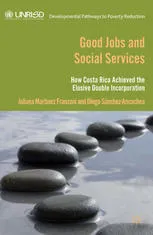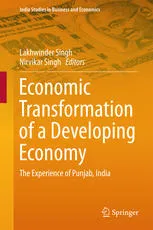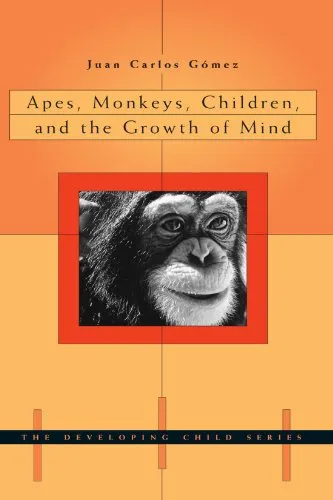Good Jobs and Social Services: How Costa Rica achieved the elusive double incorporation
4.5
Reviews from our users

You Can Ask your questions from this book's AI after Login
Each download or ask from book AI costs 2 points. To earn more free points, please visit the Points Guide Page and complete some valuable actions.Related Refrences:
Introduction
In an increasingly globalized world, economic progress and social inclusivity often appear to be at odds. Yet, Costa Rica offers a compelling counter-narrative. "Good Jobs and Social Services: How Costa Rica Achieved the Elusive Double Incorporation" delves into the rare alignment between economic structures that provide quality employment and robust, accessible social services for the majority of the population. Written by Juliana Martínez Franzoni and Diego Sánchez-Ancochea, this book unpacks the unique trajectory of Costa Rica, a small Central American country, as it achieved what so many nations have struggled to realize: "double incorporation" that ensures people are included in both the economic and social spheres.
This journey is not without its lessons, challenges, and nuances, which the authors expertly explore. Drawing on extensive research, rich historical datasets, and a comparative perspective, the book serves as an essential resource for policymakers, scholars, and anyone interested in equitable development. This introduction provides a summary of its central themes, key takeaways, famous quotes, and why this book belongs in discussions on global development and welfare systems.
Detailed Summary of the Book
The book frames Costa Rica as an exception within Latin America—a region often plagued by inequality, political instability, and inadequate public services. The central focus is on the concept of "double incorporation," an analytical framework through which the authors examine how Costa Rica successfully integrated its population both economically and socially.
Economically, Costa Rica primarily achieved this through fostering good-quality jobs secured by labor regulations and coordinated market policies that promoted inclusive growth. Socially, universal healthcare, education, and targeted social programs transformed the country into a pioneer of human development within a developing-world context. Unlike many of its regional peers, Costa Rica made systemic choices that did not sacrifice inclusivity for economic progress.
The authors trace this success to historical factors, including strong state institutions, social compacts among elites, and grassroots activism. The role of well-organized public support, particularly during the nation’s pivotal mid-20th-century reforms, is emphasized. Additionally, the book contrasts Costa Rica with other nations that pursued divergent policies, highlighting why replicating Costa Rica’s success story might be possible but difficult. The latter chapters explore challenges to sustaining double incorporation in the face of globalization, neoliberal reforms, and increasing inequality.
Key Takeaways
- Double incorporation is achievable and can foster inclusive growth, even in developing countries.
- Strong labor protections and universal social services are mutually reinforcing pillars of a well-functioning society.
- Historical decisions, state capacity, and political coalitions are critical in shaping equitable development outcomes.
- Sustaining double incorporation demands constant vigilance, especially in the face of globalization and neoliberal pressures.
Famous Quotes from the Book
"Costa Rica demonstrates that a small country with limited resources can choose to elevate the many, rather than the few."
"The marriage of economic and social incorporation is a political act, requiring deliberate choices that challenge entrenched power structures."
"Double incorporation is rare, not because it is impossible, but because it demands a long-term vision and the courage to implement it."
Why This Book Matters
"Good Jobs and Social Services" is more than a historical account; it is a roadmap for fostering inclusivity in a world where inequities are increasingly evident. The lessons from Costa Rica resonate far beyond its borders, offering actionable insights for policymakers and advocates seeking to balance economic growth with social inclusion.
In a time where austerity and market-driven policies dominate economic thinking, the book’s arguments are both timely and necessary. It shows that prioritizing workers and investing in social infrastructure is not just good morality—it is good policy. This makes it a must-read for anyone striving for a world that provides opportunities and dignity for all.
Free Direct Download
You Can Download this book after Login
Accessing books through legal platforms and public libraries not only supports the rights of authors and publishers but also contributes to the sustainability of reading culture. Before downloading, please take a moment to consider these options.
Find this book on other platforms:
WorldCat helps you find books in libraries worldwide.
See ratings, reviews, and discussions on Goodreads.
Find and buy rare or used books on AbeBooks.
1348
بازدید4.5
امتیاز0
نظر98%
رضایتReviews:
4.5
Based on 0 users review
Questions & Answers
Ask questions about this book or help others by answering
No questions yet. Be the first to ask!











![Fundamentals Of Software Engineering, 5Th Ed [Paperback] Mall](https://s3.refhub.ir/images/thumb/Fundamentals_Of_Software_Engineering__5Th_Ed__31573.webp)

